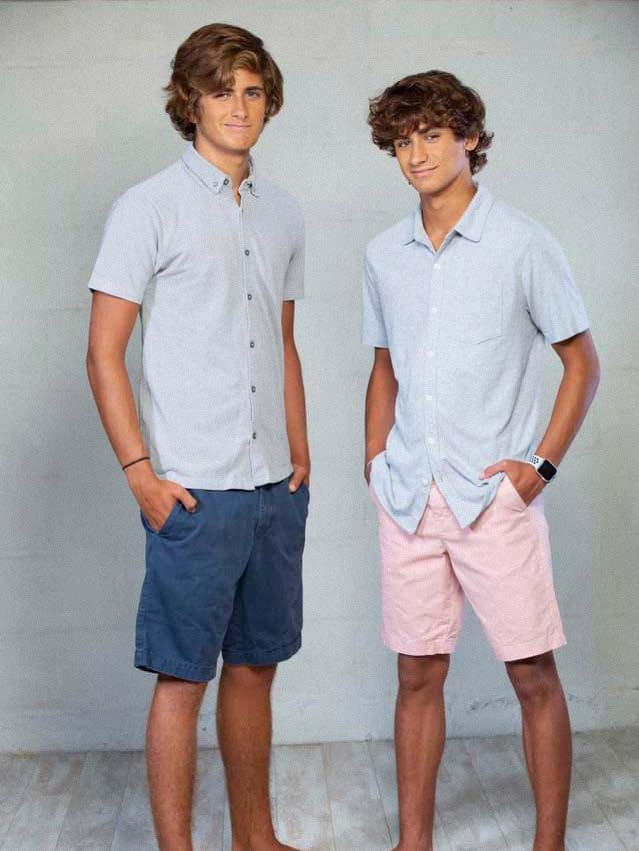
MENTORS, ROLE MODELS, AND PEERS
BY PAMELA AASEN
Both of my children, Ethan who is 19 years old and Gavin who is 16 years old, have Usher syndrome type 1; they were born deaf, are progressively losing their vision, and have severe balance issues. As seeing/hearing parents, my husband and I recognized the need to provide our children with mentors, role models, and peers. This certainly meant looking for individuals who had Usher syndrome but also included individuals with other disabilities who faced adversity successfully. Also included was our need as parents to connect with other parents who have had similar experiences.
Like most parents of a child with a disability, I had no experience to bring to the table. Being the seeing/hearing parents to two deaf blind sons, my husband and I had no understanding of what it was like to be deaf or blind in a hearing and visual world…and definitely not both. There was no history of deafness or blindness in our families; no one to turn to for assistance in understanding what their world might be like. After the initial shock and grief, I knew that it was our first responsibility to make sure they knew they were loved and accepted for who they were. It was our job to advocate for them in an able world and teach them to advocate for themselves. This I understood!
I wrote an article for Exceptional Parent Magazine in December 2019 about advocating in the community and the process that developed as my children grew. Visit: reader.medi- awiremobile.com/epmagazine/issues/205614/viewer?page=25. However, the personal relationships we built were also an important part of that journey and provided the support we needed each step of the way.
PARENT TO PARENT
Neither my husband nor I knew anything about living with a disability. We didn't use the words mentors, role models, and peers; we just knew that our sons needed to know other children and adults with shared experiences. They were quite young then, so our first focus was families. This was the early 2000's and before social media was common, when the world of disabilities was a little more hidden. It was difficult to make connections and easy to feel isolated, but we searched the internet to find organizations that related to our family. We began with attending family events hosted by the Cochlear Implant Program at the Hospital for Sick Children in Toronto. There would be three or four special events a year and the boys would be really excited to see the other children. But given their age, they weren't talking about how they were feeling or what their experiences were, they were just playing together. The awareness of being around other children that had cochlear implants was enough for us at that time. It was really more for me and my husband; we were grateful for the time to talk and compare stories with other parents at different stages in the process of having a child with a cochlear implant. Attending these events also gave us the opportunity to meet families with similarly-aged children.
We eventually met a family with boys the same age as Ethan and Gavin, whose oldest child had a cochlear implant. Our families have been friends for 15 years, a friendship that remains strong even though we have not lived in the same city or country for the past six years. We have also stayed in contact with many of the other families we have met over the years. They were all an integral part of helping us feeling less isolated and provided a support system that was invaluable.
I can't express enough the significance of the parents we have connected with, particularly once Ethan and Gavin were diagnosed with Usher syndrome. As with any parent who has a child with a disability, it is hard for others to understand and relate to the emotions you are going through. Meeting others who have a shared journey is a powerful and vital resource. As difficult as this year has been with restrictions for in-person contact, COVID-19 has brought an unexpected benefit. This year the Usher Syndrome Coalition's annual conference, USH Connections, went virtual and people from many different countries attended. We were able to make connections with families around the world.
I believe in this process so much that I became a trained support parent with SPAN's NJ Parentto-Parent Program and am an USH Ambassador for the Usher Syndrome Coalition to share my story and help connect families and individuals with resources and each other. For the past four years, I have been a facilitator for monthly Family-to-Family Community phone calls developed through a partnership between the National Family Association for Deaf-Blind (NFADB), the National Center on DeafBlindness (NCDB), and State Deaf-Blind Projects. These phone calls bring families together in a format that fits with busy lifestyles. I have also been involved with Hands & Voices, a national organization with chapters in many states that offer mentoring and parent support. Finally, I connect with families through Ava's Voice, an organization close to my heart because of my children's involvement, that is dedicated to empowering youth with Usher syndrome and educating communities about Usher syndrome.
PEERS
Though we chose cochlear implants for Ethan and Gavin, which meant intense auditory verbal therapy to teach them listening and spoken language, we wanted to expose them to the Deaf Community. I didn't want them to think I was trying to fix them or pretend they weren't deaf, my husband and I just wanted to give them the opportunity to be a part of the hearing world, too. But the reality is, they are deaf and the Deaf Community is diverse. Along with having peers in the Cochlear Implant community, we wanted them to see other children with deafness or hearing loss who used American Sign Language to communicate. So, they attended an American Sign Language summer camp for a few summers for children who were Deaf or Hard of Hearing and their siblings. When we learned they had Usher syndrome, a rare syndrome that affects an estimated 400,000 people worldwide, we knew that it would be a challenge to find peers in our community. When we moved to New Jersey in 2014, our research led to an organization, Ava's Voice, that supported a young girl with Usher syndrome.
We really didn't appreciate how much that connection would mean at the time but now our families are linked forever. In some ways, Ethan and Gavin are fortunate because, being brothers, they have a support system within our family. They understand what each other is going through. But the bond they have built with Ava is beyond anything they can give each other. The importance of having that peer support is immediately obvious when they get together and the sense of freeness they exude is tangible; nothing can replace being around someone who is experiencing the same challenges and is not judging you. The three of them also face life with the same unapologetic approach and confidence in who they are. Ethan also had the opportunity to experience this in 2018, when he attended the Explore Your Future program for college bound deaf and hard of hearing students at the Rochester Institute of Technology, the college he now attends. I will never forget when he came home and talked about how much he enjoyed the program and said the words that brought tears to my eyes, "It was the first time in my life I felt I didn't have to explain myself."
Ethan and Gavin again experienced this freedom when they attended the first ever, week-long summer camp, USHthis, in 2019 for youth with Usher syndrome, Gavin as a camper and Ethan as a counselor, hosted by Ava's Voice at the Forest Lake Camp in Chestertown, New York. It hit me even more how fortunate Ethan, Gavin and Ava were to have each other, as many of these campers and counselors had never been around someone else with Usher syndrome. At the start of the camp, while most were excited for the opportunity, some were also skeptical and doubted that it would be helpful to share what it was like to be deaf and going blind. By the end of the week, there wasn't one of them who hadn't found it to be a meaningful and profound experience. Certainly just being around others with that familiarity of living with Usher syndrome was meaningful but when they shared, they found out how much they related to each other, regardless of culture, family background, or interests.
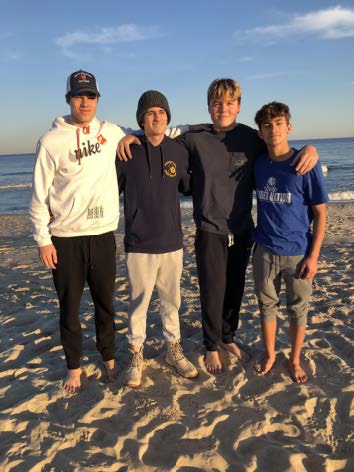
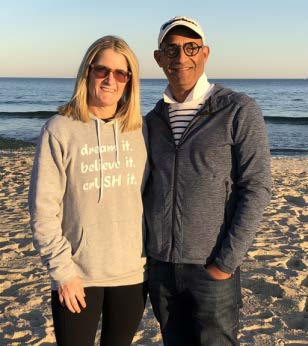
SHARED EXPERIENCES: (Opposite page) Ethan (left) and Gavin; (Left) Strong friendships despite the distance; and (above) the author with husband Carlito
ROLE MODELS
Certainly, having peers to relate to is important in the life of a child with a disability but they also need to see successful adults who are like them. We set about doing this in different ways…the first happened by accident about six months after we had learned that Ethan and Gavin had Usher syndrome. It was 2010 and Canada was hosting the Winter Olympics. There was a lot in the news about a Canadian Paralympic skier who was blind. It seemed like a good opportunity for the boys to see someone who was visually impaired competing at a national level. As we watched him and other Paralympic athletes, the boys were inspired to pick a Paralympic sport. Given that we were in Canada at the time and skiing regularly, it was no surprise that they chose skiing. I had no idea at the time that one day the boys would be competing at US National Paralympic swim and track & field events.
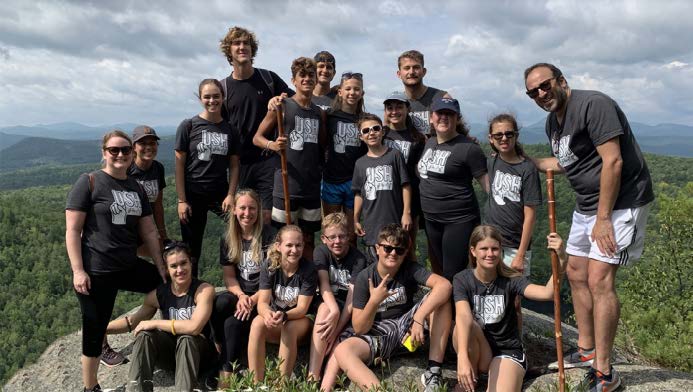
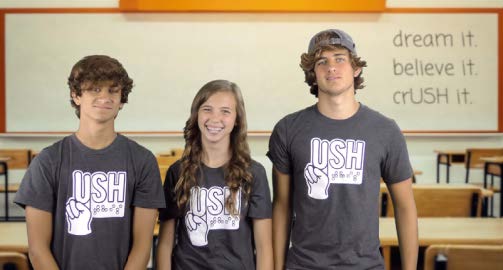
ABSOLUTELY crUSHING IT: USHthis Summer Youth Camp is a week long sleep away camp where participants engage with peers, acquire strategies to resolve challenges and foster connections that will last a lifetime.
We always keep our eye out for stories that highlight adults like them having success in different parts of life. They met a young man who has cochlear implants who was a race car driver. They read a story about another young man with a cochlear implant who was playing for a minor league baseball team. They watched two Deaf individuals compete on Dancing with the Stars, and a Gap commercial featuring two women with Usher syndrome. Ethan went to a camp to meet blind engineers because he wanted to study engineering in college. They learned about an author, psychologist and extreme athlete who has Usher syndrome, and about the first deaf-blind Harvard graduate and an educator with Usher syndrome. As they began their own venture into Paralympic swimming, they discovered a Paralympic gold medalist swimmer with Usher syndrome. And there is the successful charitable organization Two Blind Brothers. We can also look to organizations who feature successful individuals and tell the stories of regular people who are bravely facing their challenges with determination. We feel fortunate to have the Usher Syndrome Society, which gives a face to Usher syndrome through photojournalism and video storytelling for those who have not heard of the disorder and for those looking for stories about people like them.
The other thing about role models is they don't have to have the same disability. When we watch the Paralympics, we are not just inspired by those with Usher syndrome. Everyone across the world has been inspired by Terry Fox's run across Canada and Rick Hansen's wheelchair journey around the world. More recently, the individual who was the first person with Down syndrome to complete a marathon did not just inspire those with Down syndrome. The important take away is that our children are looking at people who have succeeded in spite of challenges and barriers.
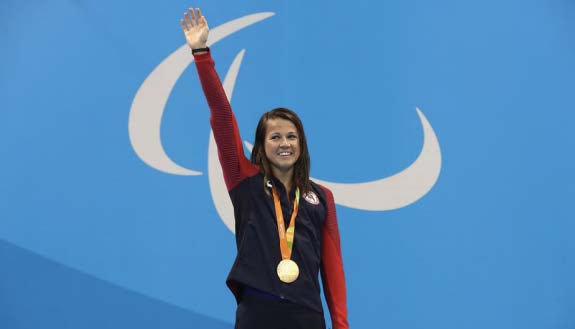
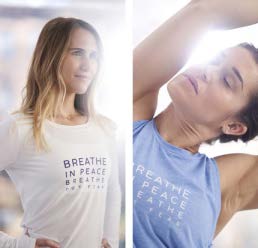
MODEL BEHAVIOR: Becca Meyers, Paralympic swimmer (above) and a Gap commercial (right) featuring Hannah Corderman & Rebecca Alexander. Ethan and Gavin's family always keep their eyes out for stories that highlight adults like them having success in different parts of life.
MENTORS
When Ethan and Gavin were young, along with sending them to an ASL camp, I discovered an organization in Canada, Silent Voice, that had Deaf Mentors who would come into a family's home to teach ASL and introduce the family to the Deaf Community. Many states offer Deaf Mentor programs through family-based organizations or Schools for the Deaf. New Jersey has a Deaf Mentor Program through SPAN, of which I am the Project Director. My goal at that time was to show them different communication choices in the Deaf Community and also expose them to different languages. Their father was Spanishspeaking so they also went to Spanish school for a short time. Though I feel these opportunities were important and appreciated, their lives have been mostly mainstream and in English. For most of their lives, they have been very successful cochlear implant users, but there is no guarantee the implants will work forever. As they have gotten older, they have expressed interest again in learning ASL and, if it is ever necessary, they have had that exposure and it won't be completely foreign to them.
My oldest son, Ethan, is currently taking ASL at the Rochester Institute of Technology, which houses the National Technical Institute for the Deaf. They have extraordinary support and mentoring services available for D/HH students in every communication mode. They have over 1000 Deaf, Hard of Hearing and Deaf Blind students and are building a network of successful professionals in an environment where they can fit in and pursue their dreams. A lot of research has been done on Deaf Mentors and Mentors for children with disabilities. The National Mentoring Resource Center's review of that research found that, "Potential benefits of mentoring programs for youth with disabilities include several in the areas of academic and career development, employment, psychosocial health and quality of life, transition, and life skills." (Lindsay, S and Munson, M. "Mentoring for Youth with Disabilities" National Mentoring Resource Center, October 2018, nationalmentoringresourcecenter.org).
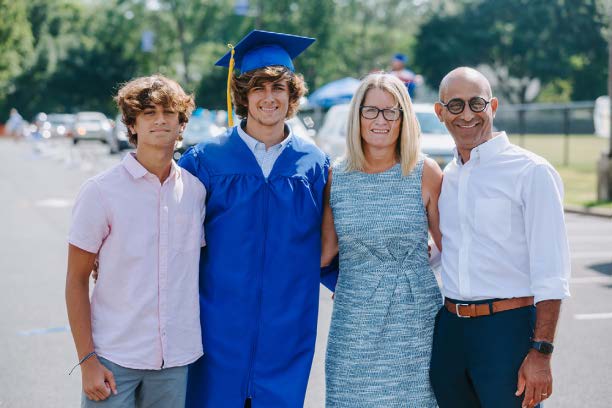
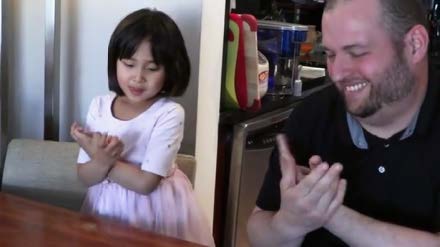
MOMENTS BIG AND SMALL: (Above) Celebrating Ethan's high school graduation; (left) SPAN Deaf Mentor Program participants conduct an exercise together.
FORMING RELATIONSHIPS
The differentiation I make between role models and mentors as I write about them is the personal relationship. When I looked for role models for my children to look up to, we didn't necessarily know them, but I looked for someone I could tell them about, someone they could research, or a story they could read about or watch on TV. Ethan and Gavin were fortunate to have formed relationships with some of these people who have now become their mentors. The bond that has been forged is lifelong and one in which age difference does not matter; it is the relationship of shared experiences and mutual understanding.
I can't change the reality of their disability for my children, I can only support them and try my best to give them what they need to build their confidence, find their inner strength, and develop the fortitude to work hard to succeed and achieve their dreams. It was my hope so many years ago that what I can't provide for them, they could find through mentors, role models, and their peers. That hope is coming true, and now I hope as they find success and achieve their goals, they can in turn be peers, mentors, and role models for others.•
ABOUT THE AUTHOR:
Pamela Aasen is the parent of two children with multiple disabilities, and serves as the Director of the EHDI (Early Hearing Detection & Intervention) Mentoring and Family Engagement Project at SPAN Parent Advocacy Network. For more information, see spanadvocacy.org/programs/ehdi